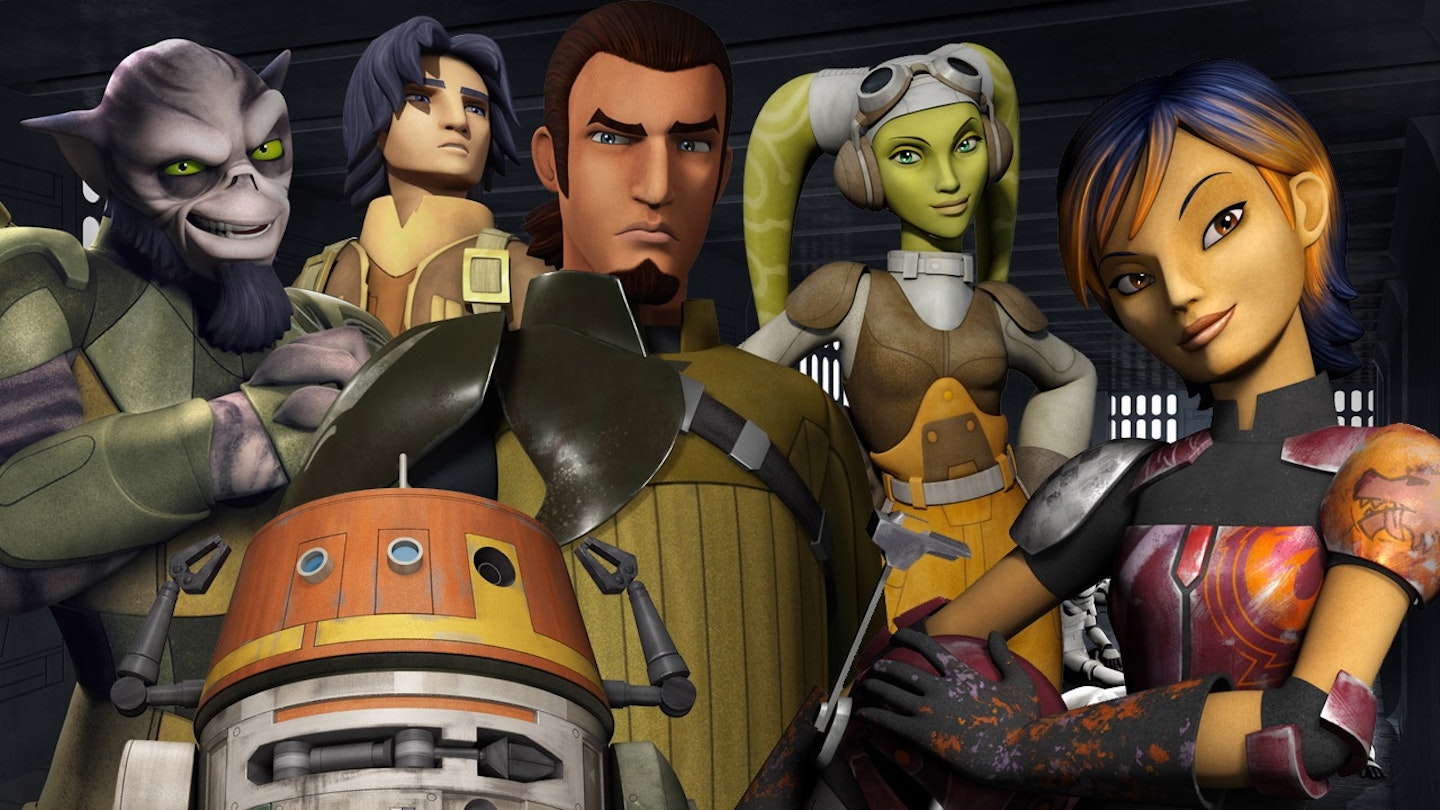One of the casualties in Disney's acquisition of Lucasfilm was the animated series Clone Wars, but arising in its place has been its successor, Star Wars Rebels. Now prepping its third season, the series, created by Dave Filoni, Simon Kinberg and Carrie Beck, serves as a bridge between Revenge Of The Sith and A New Hope in the same way that Clone Wars bridged Attack Of The Clones and ROTS.
In the beginning, the show's core group of characters consisted of Ezra Bridger (voiced by Taylor Grey), 15-year-old human con artist on the planet Lothal who discovers he has Force abilities and finds himself a crewmember of the ship, the Ghost; Kanan Jarrus (voiced by Freddie Prinze, Jr.), a Jedi survivor of Revenge Of The Sith's Order 66 which saw the near extermination of his kind; Hera Syndula (voiced by Vanessa Marshall), the Twi'lek owner and pilot of the Ghost; Sabine Wren (voiced by Tiya Sircar), the 16-year-old Mandalorian who is a graffiti artist and well as an expert in weapons and explosions; Zeb Orrelios (Steven Blum), a Lasat honor guard whose people were one of the first species to rise up against the Empire and, as a result, were all but exterminated; and C1-10P (also known as "Chopper"), an astromech droid built and owned by Hera.
Dave Filoni (executive producer/director): One of the crazy things about Rebels is that when I sat down at the table, we pitched around really quickly what kind of show we were going to make. We had a matter of, honestly, weeks as opposed to where you would normally have months. Carrie Beck said, "What about something that kind of feels like The A-Team, with a small group of people in a van. They're rebels fighting for a cause and will fight small fights." I liked that. If you look at the Art Of Clone Wars book, one of my original pitches for that show was exactly the show that Rebels has turned out to be. Which is a group of people living on one ship travel around trying to do some good underneath the bigger war. Then we added Simon Kinberg.
Simon Kinberg (co-creator/executive producer): I was already working in some capacity on the Star Wars features when Kiri Hart, who's the head of the Lucasfilm Story Group, reached out to me and asked, "Do you want to do an animated show for Disney Networks?" I was obviously very interested. They had an idea for an A-Team style show. It was about the birth of the early days of the Rebel Alliance and it was an ensemble show. The thing that I brought to it was to try and turn that group into a proto-family unit. None of them are actually blood-related, but they operate like a little family. I had a perspective about who the main characters should be as a way into the show. Everybody had different parts of the concept and we all just combined and worked hard together.
Henry Gilroy (executive producer): The family component is what brings people back week to week, because you're watching this family go through this struggle, but you're also seeing them grow together. You're seeing the various personalities merge and the conflict that's there. That's something that everybody can relate to. Clone Wars was almost more esoteric, because you would spend four hours with these characters over here, then you would spend four hours with these clones over there; and then you'd spend four hours with the bad guys, like the Sith. It was awesome, because you're telling this epic expanding storyline. It basically gave you a taste that the galaxy really is at war, whereas Rebels really allows you to get into the interpersonal dynamics of the family structure, even though it's sort of a dysfunctional family. You're attracted to the characters and the show just because of that. All the space battles and lightsaber stuff kind of goes on top of it, and it's awesome, but underneath it all I get more worried if Kanan and Ezra are fighting.
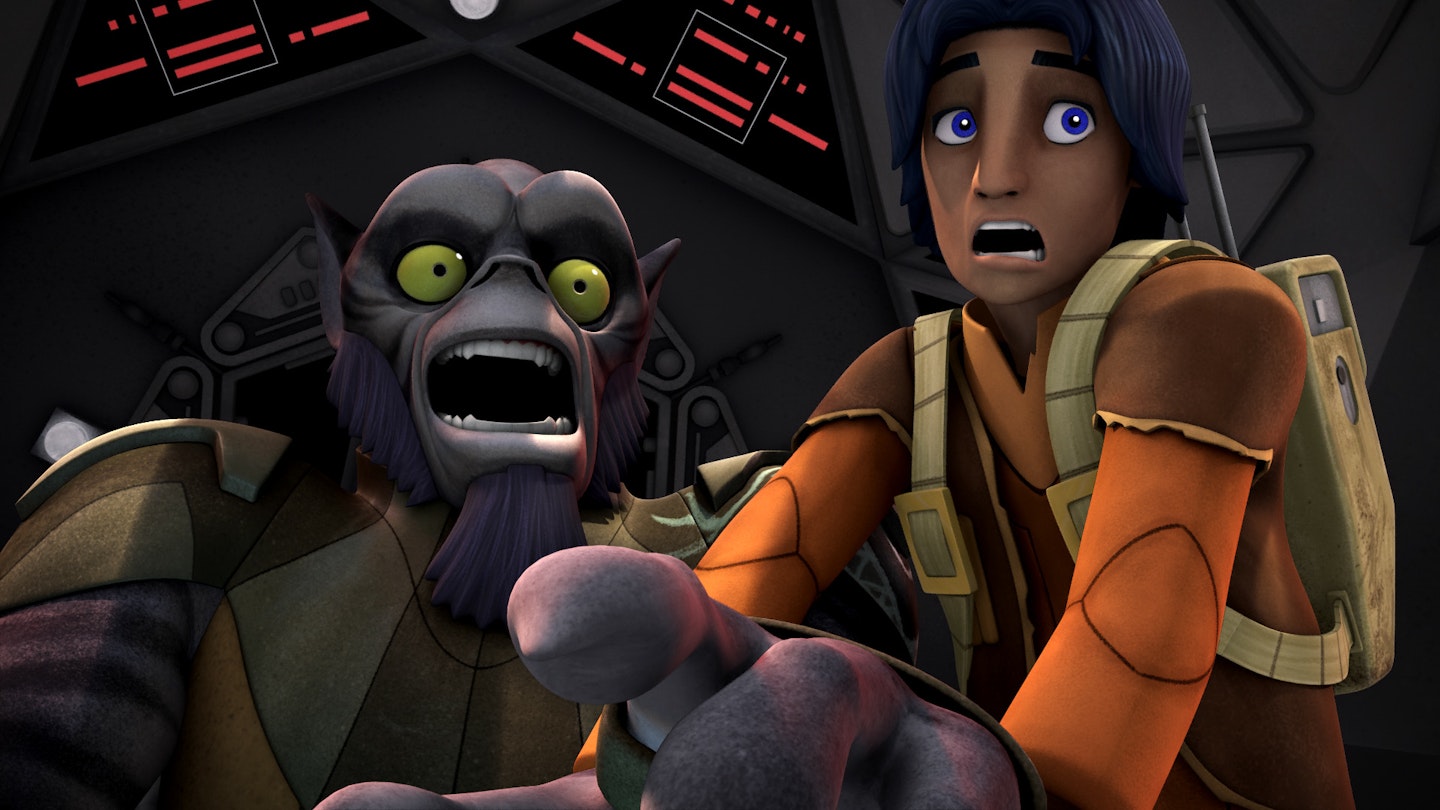
Kinberg: There are missions and plots every week, and pretty intricate ones - especially for a half hour show - but it is so focused on the characters. We talk in arcs of seasons about them. What their story is, what their emotional arc is. All of that is discussed pre-season. The first season for us was very much a family coming together and starting to fuse that family. In the second season it was very much about the family getting challenged, fractured, and having to expand and create upon itself with new members.
Filoni: One of the things I'm most proud of is that the characters are always evolving and changing as a result of their experiences. Season one was really about bringing this family closer together. By the end of it, Kanan is much more committed to his Jedi past than he was before Order 66. Ezra is trying to figure out what it means to be a young Jedi in this time when there is no real order outside of his own master. He's one of the few kids to train without a huge structure of what it means to be a Jedi Knight living in a temple on Coruscant, like they were for a thousand years. Hera is transitioning from being a small-time captain of a cargo ship to more of a leader of a growing rebellion in the galaxy. We revealed by the end of season one that it's something she was always a bit more privy to than the rest of the crew, as far as getting people together to fight.
Sabine is one of our most mysterious characters, being Mandalorian. She had a lot of obvious trust issues. She likes to fight, but does she really like to fight for a cause? Her trusting the team gradually developed. Zeb's our most steady running character. He lost so much from his planet that he's just trying to accept this young boy, his younger "brother," and to protect him. He's got a very protective nature, having lost so many people on his planet. He's a little bit of glue that holds the family together. And Chopper is still Chopper. I don't know if Chopper evolves much. He starts off being somewhat of a helpful jerk, and he's still a rather helpful jerk. That's a droid for you.
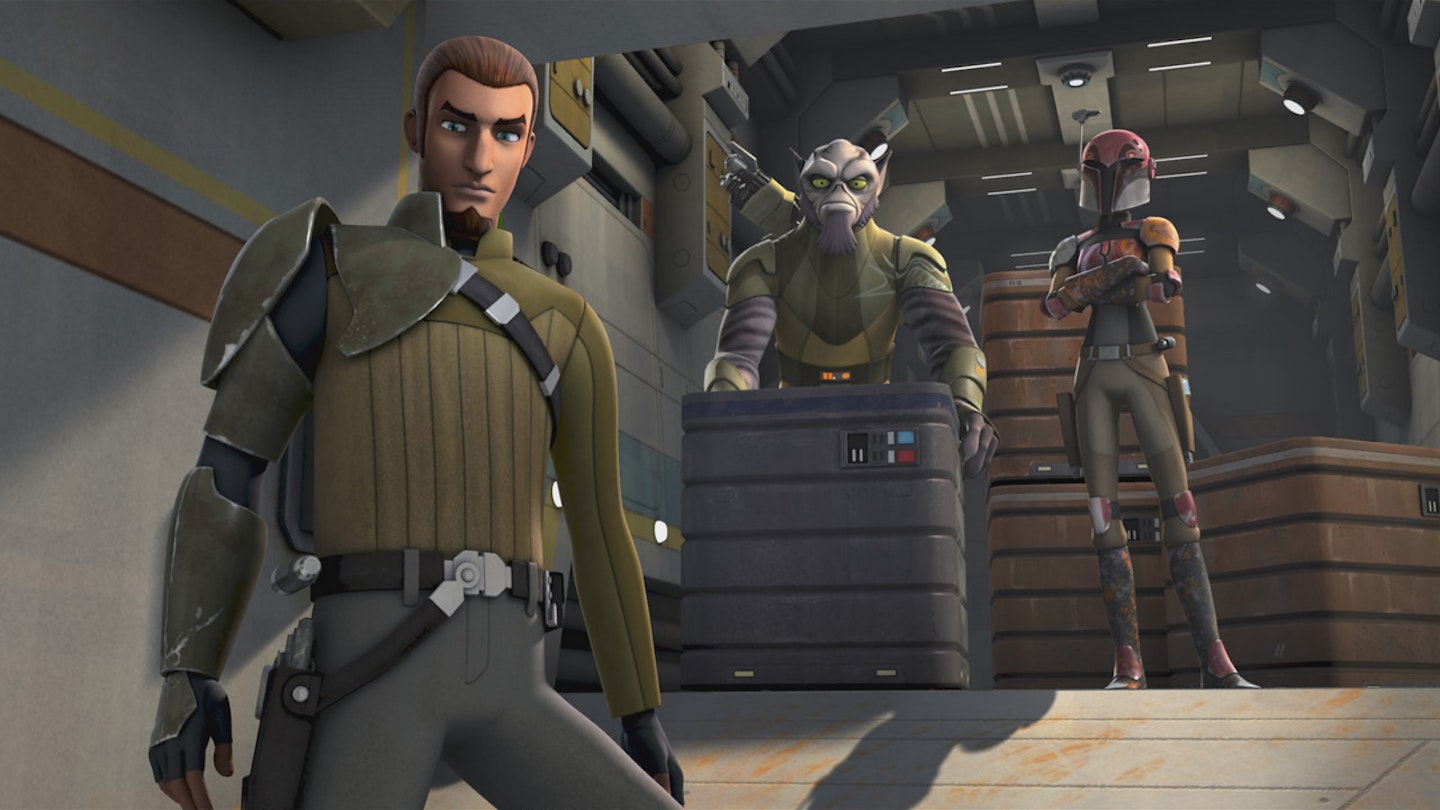
Gilroy: In the beginning, the characters were a small group performing hit-and-run tactics, but by the end of the first season they were basically challenging the Empire. When you blow up Grand Moff Tarkin's star destroyer, you're in trouble [laughs]. And once you get the attention of the Empire, you're going to have to deal with the consequences of that. The difference between season one and season two was like going from high school to college. Once you're in college, you're exposed to all these new things. Some of them are really great, you get allies, but then on another day the bad guys you're going to be fighting are going to be much more powerful, too.
One of those allies was Ahsoka Tano, Anakin's former apprentice from Clone Wars, an addition that the fans of the series fully supported.
Filoni: Bringing Ahsoka in was always the plan. I didn't want to be selfish, but I really like that character. I did feel she could have a role to play, but none of us were prepared for the reaction. The fans have been very vocal about their excitement and that was surprising. Star Wars is changing a bit. Where it's always been about the Original Trilogy fans - they've been the ones that have ruled and run things from the beginning - I've found that over the last several years the prequel generation has become very vocal as they've grown up. Now the - you can almost call it - animated generation of Clone Wars is vocal in their own right. I imagine in the future the Force Awakens generation is going to say, "Ours is the best."
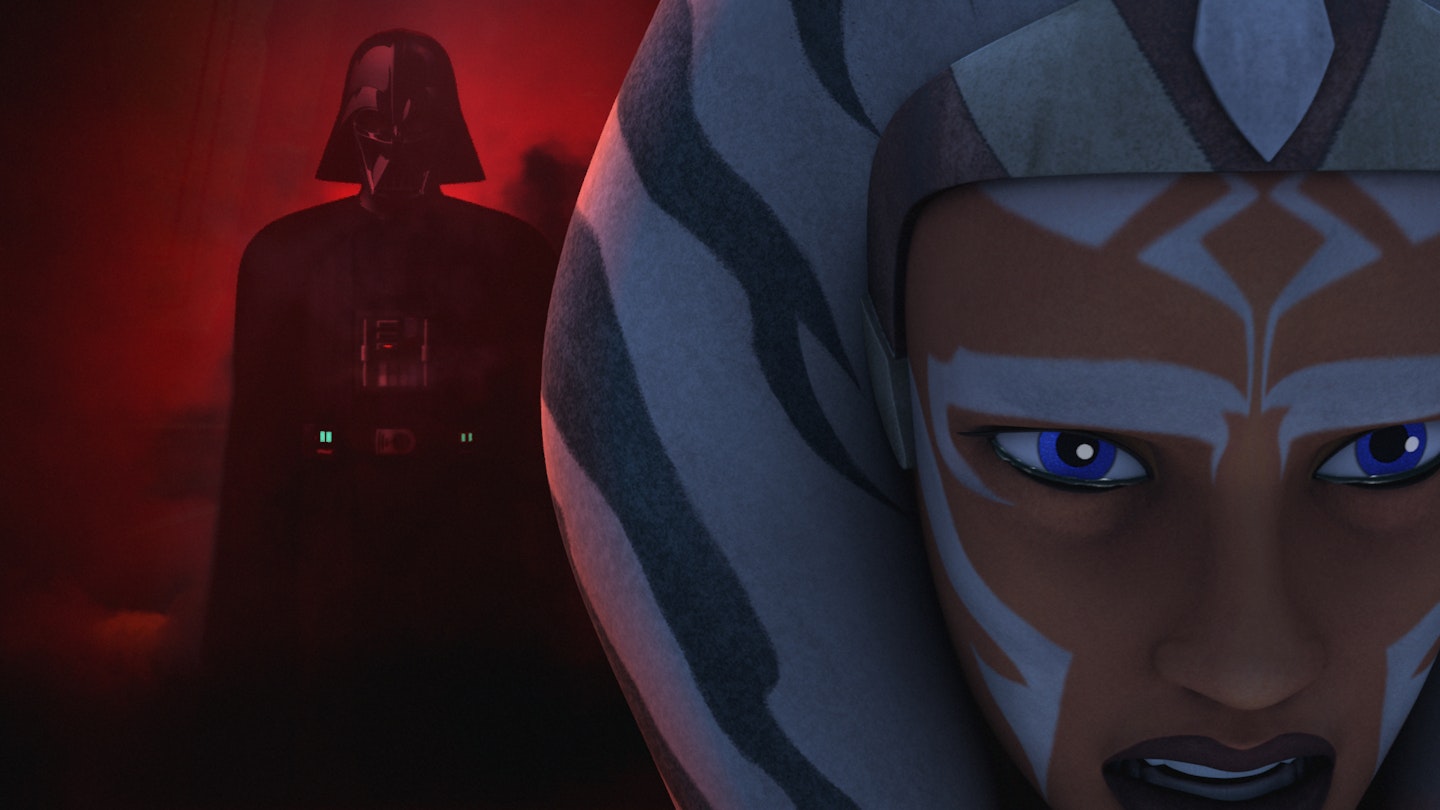
But what is Ahsoka without Anakin, better known as the Dark Lord Of The Sith, Darth Vader? That answer unfolded in season two with the recurring appearance of that character as voiced by James Earl Jones.
Kinberg: There is no question for me that the most insane, fun, intimidating and exciting experience that I ever had as a writer was that first time in Rebels I wrote dialogue for Darth Vader. If you said to my seven-year-old self that I was going to get to write dialogue that Darth Vader would say, and that James Earl Jones was actually going to say... well, I wouldn't have known James Earl Jones at the time, but in my mind, the real Darth Vader was going to say those lines....that would have been more surreal than anything that's happened to me since and anything else I probably could imagine.
Filoni: We never wanted fans to think Rebels was going to change into some kind of Vader show. I've just always felt that our characters, in the great scheme of things, are small potatoes for Darth Vader. If Vader is going to come in, he's going to deal with things and deal with them simply. A bit of a game changer for Vader was his realization that Ahsoka is still alive, and not only is she still alive, but in the beginning of season two he thinks he knows where she might be and she might be able to lead him to other surviving Jedi. And like any really smart villain, Vader will withdraw from the story and send out his attack dogs, which are the Inquisitors. They're the ones that really sniff things out and figure out what's going on. To say the Emperor is a genius is an understatement.
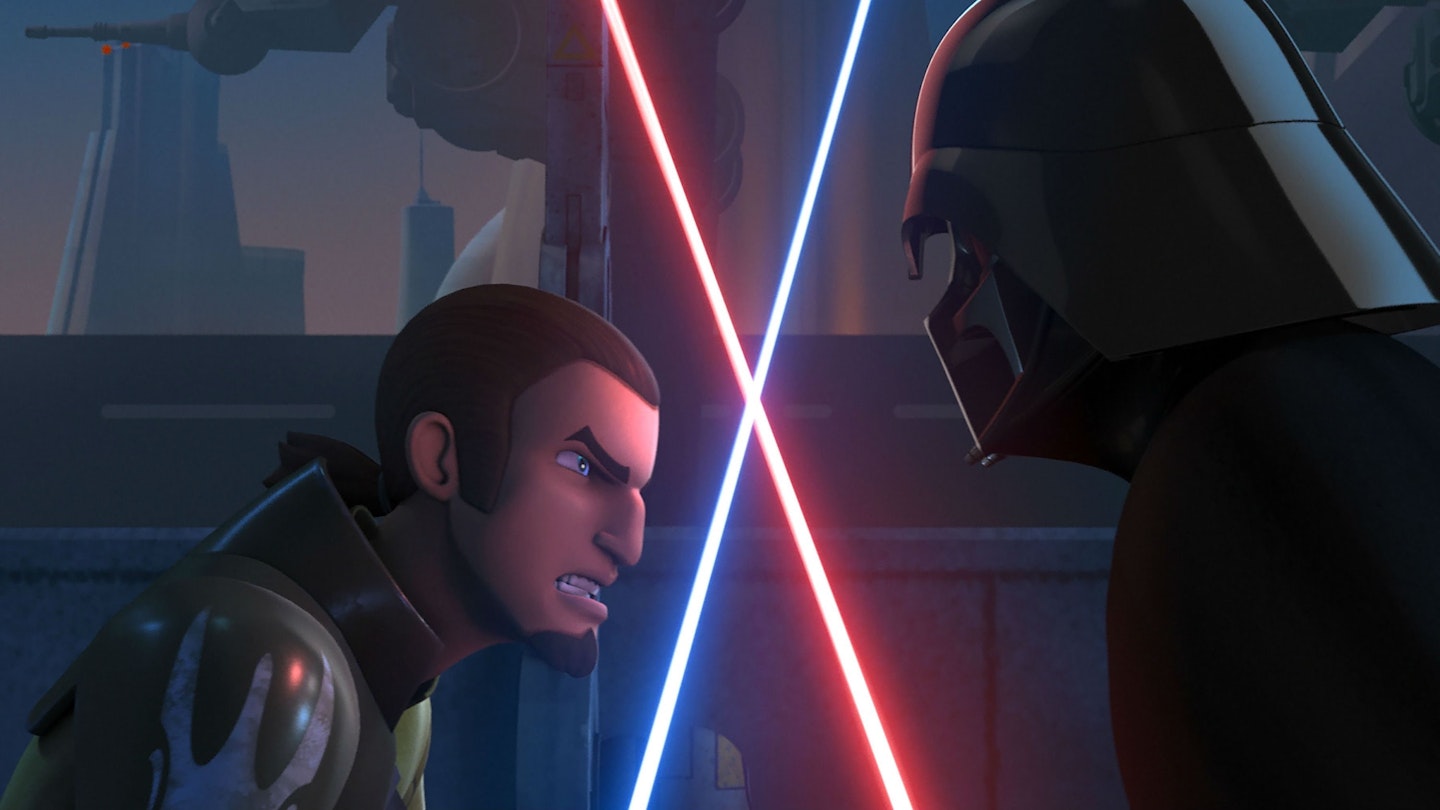
Gilroy: Vader as a regular character wouldn't happen, because it would be a situation of diminishing returns for the character. One of the things that George Lucas asked Dave when he was basically passing on the baton to him to continue on making Star Wars, was not to diminish Vader. To not ever make him lighter. That whenever we are going to have James Earl Jones doing the voice of Vader, he will always be a formidable character.
Filoni: What's great about Vader and the Emperor is that they're willing to play a very long game for victory. Vader appeared a few times in season two, but Ahsoka actually had a larger role than he did. It's more interesting to see this all from her side, a lot of that having to do with maintaining the mystery of Darth Vader. We know so much about Anakin, but as Vader his story is really about him and his son, Luke Skywalker. That's the story that George chose to tell, because it's so important. We have a story we get to tell that affects Vader, which is this student of his. People want to know what the eventual confrontation between these two would mean, so it made sense to have our characters from Rebels interact with her and get drawn into the story of it as well. We just had to make sure that the story of Vader and Ahsoka was actually serving the story of Ezra Bridger in a meaningful way.
Kinberg: The thing that drives everyone working on the show is that we all love and take Star Wars so seriously. We didn't want to do a show that was a mission of the week. It was so important to us for the characters to live and breathe as much as the characters in the movies do. The approach for everyone is not that it's a cartoon, or it's an animated show. It's an adventure show about these characters that are going to live alongside the greatest characters of all time. They occupy the same universe as Luke, Leia, Han and Darth Vader. We need characters that you could put in a scene with Darth Vader and not get eaten alive.
The saga of Star Wars Rebels will continue on DisneyXD in both the US and UK.
